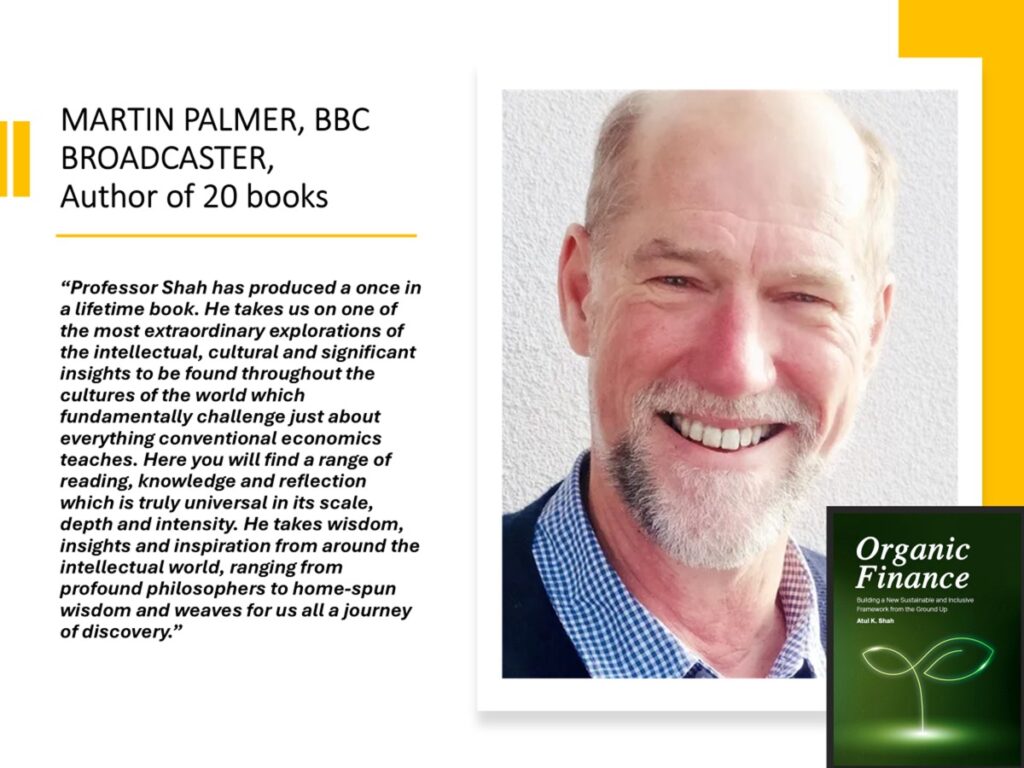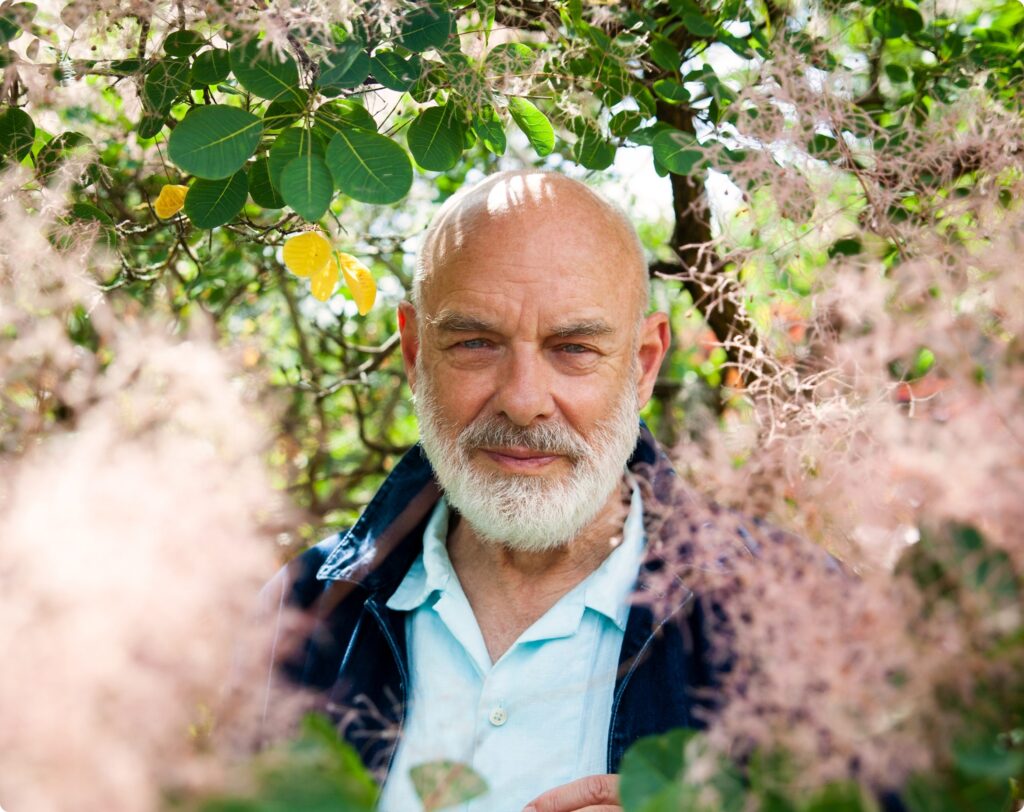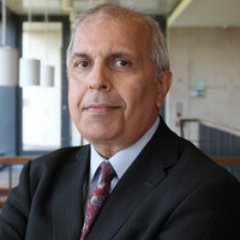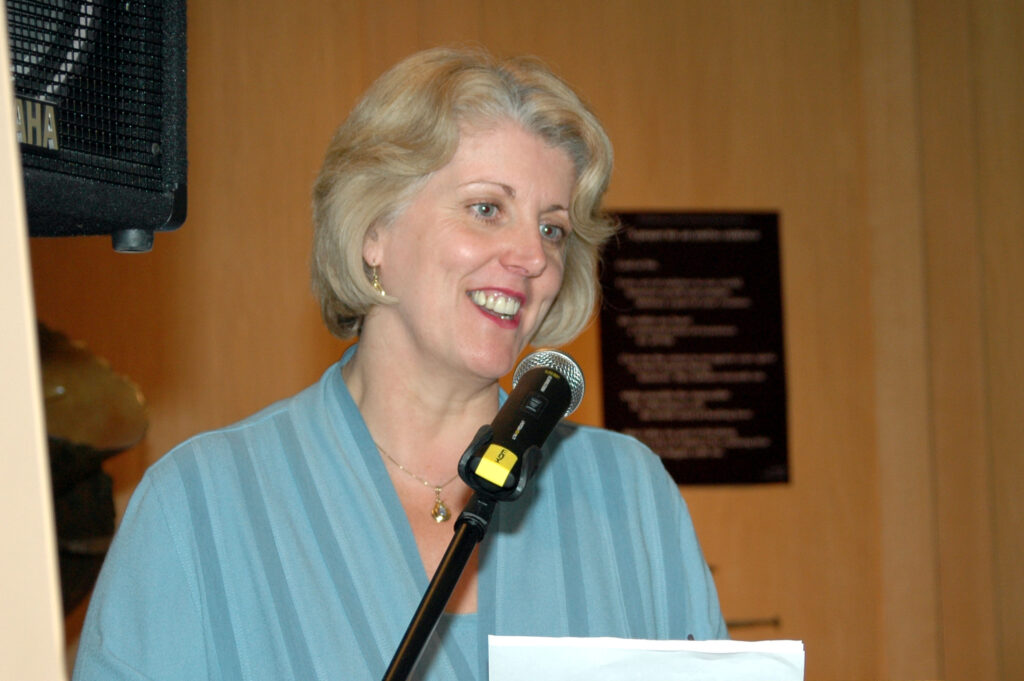PROFESSOR ATUL K. SHAH www.atulkshah.co.uk
Globally renowned expert advisor and broadcaster on culture, accounting, finance, business ethics, holistic education and leadership
SUMMARY
Modern finance science is profoundly broken and damaging, morally and culturally. It has no choice but to change its theory and pedagogy – but the question is how and in what ways? Western science and its focus on secularism and materialism has made itself incapable of the transformations needed in society given our global calamity. Experts trained in finance lack not only the wisdom to change, but also the tools to see the world from a very different, kinder, gentler and more caring paradigm. In truth, the planet is bio-diverse, and so is society, with a huge tapestry of faiths, customs, beliefs and practices in finance, many of which are sustainable but sadly not highlighted or discussed in any curricula globally. A holistic approach is urgently needed.
This book builds a new un-anthropocentric moral and sustainable finance from the ground up, helping students, professionals and scientists to reconstruct the knowledge and connect it to indigenous beliefs. An interdisciplinary, non-technical approach is adopted. Respect for all living beings, the protection of forests, soil and soul, and the importance of trust, culture and relationships are critical to building harmonious communities. Research and pedagogy have been re-connected. Examples and techniques to re-engineer the science are offered throughout the book. These make culture and ethics pivotal and showcase new grounded methods of education which include field trips, dialogues with small farmers and entrepreneurs, and learning from different cultures and beliefs. It will enable many people from alternative cultures and beliefs to speak about their own perspectives and practices in finance, without shame or marginalization.
Eminent experts from all over the world have given the testimonials below:

KEY CONTRIBUTIONS OF THE BOOK
- The Anthropocene requires us to change our knowledge and behaviour towards animals and the environment
- Finance has cushioned itself from morality, responsibility and accountability through its equations and technocracy, commanding huge power at the same time – and causing irreversible damage
- There are many living cultures in the world who have a very different belief system and behaviours which are compatible with a respectful community and society – these wisdoms embrace animals and nature rather than plunder them
- Organic Finance offers a fresh perspective on the logic and science of finance which is holistic and respectful of the ecosystem
- It also embraces morality, belief and trust, which are foundational to finance, but have been suppressed for far too long
- The book offers a paradigm shift and makes finance more responsible and accountable
- It also decolonises the curriculum by embracing minority cultures as possessing prescient knowledge which can help us rewrite our science and make finance education personal and holistic
FULL REPORT WITH VIDEOS OF THE GLOBAL BOOK LAUNCH
“Atul Shah shows us that another finance is possible and already among us: meaningful, inclusive, diverse, and more-than-human, but also often marginalised, dismissed, and unheard. We all need to listen.”
Professor Hendrik Vollmer, Warwick Business School, Editor of Handbook of Accounting in Society and Associate Editor of European Accounting Review.

Reading Atul Shah, you realise that classical and modern economics has excluded as ‘externalities’ almost everything that really matters to us and our lives. Here is the prospect of a compassionate economics that talks about what really matters and exposes indigenous beliefs which have long been hiding in plain sight.
Brian Eno – Multi-Award winning Musician, Artist and Political Activist
Culture, Faith and Ethics in Finance have become divorced from the discipline for far too long and resulted in great social disruption. In this book, Professor Atul K. Shah makes a bold and multi-cultural effort to connect the knowledges, and show how so many organic practices in finance have been hiding in plain sight and are prescient and helpful to our modern predicament. I hope this book will spawn a whole new constructive literature on multi-cultural finance.
Charles Richard Baker, Professor of Accounting, Adelphi University
BUY THE BOOK ROUTLEDGE OR AMAZON
Homo Economicus is a fiction created to support a world view. Today, finally, he is at least ailing and perhaps expiring. What replaces him will define the future of our species. Modern finance has removed the reality of history, culture and context from its science and education methods to perpetuate the myth of Homo Economicus. This is unsustainable. There always was another way, that more accurately reflected who we are, and what truly enriches us. Professor Shah’s plural perspective draws from heritage and wisdom traditions which deeply understand the nature and limits of money, and replenish trust and relationships.
Russell Napier, Founder, Library of Mistakes
New paradigms do not arise often. Finance in particular has seen little innovation outside the confines of neo-classical economics that articulates, more often than not, a view devoid of wider humanistic concepts. Professor Shah discusses with aptness a multi-cultural organic conceptualisation of finance that speaks to wider environmental and ethical issues of our time. The book will not disappoint those seeking a broader perspective of the field.
Professor Alnoor Bhimani, London School of Economics
This is a timely contribution, rich with original ideas to rethink the purpose, meaning and teaching of finance – to decolonize it from its destructive and exploitative relations to humanity and ecology. It opens a new strand of literature which enables indigenous cultures to speak about their own rich heritage of finance wisdom in a positive and constructive way, which the dominant western paradigm has ignored to devastating effect for far too long.
Professor Afshin Mehrpouya, University of Edinburgh, Chair in Accounting, Sustainability and Governance
Leadership and Finance are often at odds. Culture and belief bring the much needed balance to the scale and encourage purposeful entrepreneurship, with a strong spirit of selfless service to nature and society. I salute this research innovation which has the potential to change global professional training in finance, and root it in ethics and values.
Margreeth Kloppenburg, Chair of the Board Faculty Ethics, Culture and Behavior of the Royal Netherlands institute of Chartered of Accountants
Finance is a siloed and broken science which excludes diverse wisdom and perspectives. Atul Shah boldly and authoritatively shatters these fences to reveal profound pearls of wisdom hiding in plain sight. Being committed educators and students for an ecologically and socially just future for everyone, we have no choice but to engage and transform our curricula so that we become part of the solution to the unsustainable Anthropocene.
Professor Chandana Alawattage, Adam Smith Business School, University of Glasgow

The discipline of finance needs a complete overhaul to remove its ethical, cultural and political bankruptcy and denial. Professor Atul Shah weaves together an alternative narrative grounded in the wisdom of many contented communities and cultures of the world which knew how to put finance in its place as a servant of society, never its master. He has dedicated several decades to this project. I welcome this plural, grounded and holistic narrative, and call upon educators and scholars to embrace it and transform their research and teaching, as without timeless wisdoms, we are doomed to fail our planet.
Professor Lord Prem Sikka, House of Lords, UK
“Organic Finance” reinterprets money as a catalyst for inclusive and sustainable development, challenging conventional economic beliefs. It offers a culturally grounded, empathetic strategy for transforming money to benefit the world and its inhabitants, contesting the greed-driven, materialistic underpinnings of contemporary society. A novel strategy for the ethical reconfiguration of the financial system.”
Dr. Malay Patel, Expert in Strategic Management and Cultural Philosophy
Atul K. Shah shakes up neoliberal and neocolonial ideologies with a bold vision of finance in the service of human and ecological flourishing. A gift of indigenous wisdom – inspiring and liberating!
Dr. Melanie Barbato, Senior Lecturer, Pacific Theological College, Fiji
Author of Jain Approaches to Plurality: Identity as Dialogue
As a mathematician I have come to understand the beauty and elegance of equations when it comes to finance, but the abstraction is not the reality and we forget it to our peril. This multi-cultural narrative captures the breadth and depth of personal and corporate finance in ways which radically reignite our hopes for sustainable finance. It opens a wide new field of enquiry.
Professor Janette Rutterford, Open University
“Atul K. Shah’s Organic Finance is a necessary intervention in today’s global discourse on finance. With his bold critique of mainstream economic paradigms and incisive exploration of alternative wisdoms, Shah reimagines finance not as an imperialistic tool of greed, but as a communal force for sustainability and ethical growth. I see striking parallels between Shah’s call for financial pluralism and the innovations of historical merchant families, who balanced profit, trust, and social responsibility across generations. This is a timely manifesto for scholars, educators, and leaders seeking a humane and inclusive future through business.”
Sudev Sheth PhD, Author of Bankrolling Empire: Family Fortunes and Political Transformation in Mughal India (Cambridge University Press, 2024)

Professor Shah offers a new paradigm and language through theory that is pluralistic, wholesome, organic and creative, drawn from the profound wisdom of nature, faith traditions and indigenous cultures. He enriches the understanding of finance far beyond its current models and formulae. His powerful inter-disciplinary approach, aligned with his critiques of finance from his economics training at the world-renowned London School of Economics, are impeccable and game changing. His understanding of, and challenges to, mainstream equations and technocracy open up a large ocean of diverse possibilities and deeper wisdoms.
Dr Lynne Sedgmore CBE, author of ‘Presence Activism’
We live in a tempestuous, awful era; it is one in which our planet is under grave threat from climate change, 25,000 people including 10,000 children die of hunger every day and in 2021 Global hunger numbers rose to as many as 828 million (UN estimates). Blameless men, women and children are being killed by the sophisticated (and extremely expensive) weapons of war.
There seems to be something completely rotten and soulless at the heart of our political and economic systems. We urgently need to find kinder, more intelligent alternatives which cherish human life and nature. Atul Shah’s new book sets out such an alternative. This makes it an important intellectual resource for those concerned with the state of our planet today – a beacon of light in a very dark world.
Professor Christine Cooper, Editor, Critical Perspectives on Accounting Journal
Organic Finance is both a critique and a manifesto for change. Its witty, provocative and accessible style should appeal to finance professionals, policymakers, and educators. Using deep insights and practical examples, the book inspires a hopeful vision of financial systems founded on care, equity, and sustainability and seeks to civilise finance. For India, this magisterial work is highly relevant to how finance actually operates on the ground – our western textbooks urgently need to change to adapt such organic science.
Professor R Narayanaswamy, Professor of Finance and Accounting (Emeritus), Indian Institute of Management, Bangalore
The failure of modern public financial management stems from a technocratic global policy mechanism (blunt instruments) that assumes one size fits all – China should respond the same way as a small Pacific Island. What is necessary is to understand the culture and context and build from the ground up instead of an arrogant and ignorant top down approach. We need a new inclusive paradigm which multiplies trust and social capital and Professor Shah shows how. We have no choice but to take heed.
Professor Khalid Hamid, International Director, CIPFA (Public Accountability)
We need all hands to address our sustainability and inclusivity challenges. Yet too many well-intended people remain hampered by assorted business fictions and myths. Professor Atul Shah offers a provocative fix through a reconceptualization of financial practices holistically grounded in cultural sensitivity and an ethic of environmental stewardship.
Professor Daniel T. Ostas, JD, PhD, Chair of Business Ethics, University of Oklahoma
The depersonalised, rapacious values of modern Finance are central and dominant in ordering our lives. Organic Finance is timely in exposing the socially divisive and ecologically damaging effects of financial nihilism. And, crucially, it presents a communitarian, holistic alternative based upon tried and tested indigenous practices.
Professor Hugh Willmott, Bayes Business School; Cardiff Business School

‘Finance buries its morality under equations and calculations, helping to destroy the planet whilst profiting from its inequality and environmental catastrophe.’ The boldness with which Professor Shah challenges this truth and constructs a new organic theory is highly laudable. In India, there are millions of family businesses motivated by faith and spirituality that operate organically and are contended to grow without debt and serve their customers honorably. Greed is constrained by relationships, principles and values and the need to pass the business on to future generations. This science deserves to be globalised, and Organic Finance is a timely blueprint.
Professor Devendra Jain, Flame University, Pune, India
Professor Shah’s new book is prescient in trying times, exposing how Empire is deeply woven into the equations of Finance. He shows that a timeless indigenous way is needed to protect our culture, ethics and environment and prevent selfish finance from depleting humanity.
Dr Anton Lewis, Associate Professor of Accounting, Governors State University, USA
Author of Counting Black and White Beans. Critical Race Theory in Accounting & Accounting Fables. Tales of Race and Racism in the Borderlands of Business.
Atul Shah re-examines modern finance thinking through an eco-centric lens to surface and address crucial silences and deficiencies in current theories and practices. Provocative reading for a planet in deep crisis.
Professor Rajib Doogar, University of Washington
This is a truly inspiring book that serves as a beacon of hope. Drawing on multiple cultures and beliefs, Professor Atul Shah identifies how business and society can reshape and reorganise to move into a postcapitalist era to heal mother earth.
Professor Alpa Dhanani, Cardiff Business School
